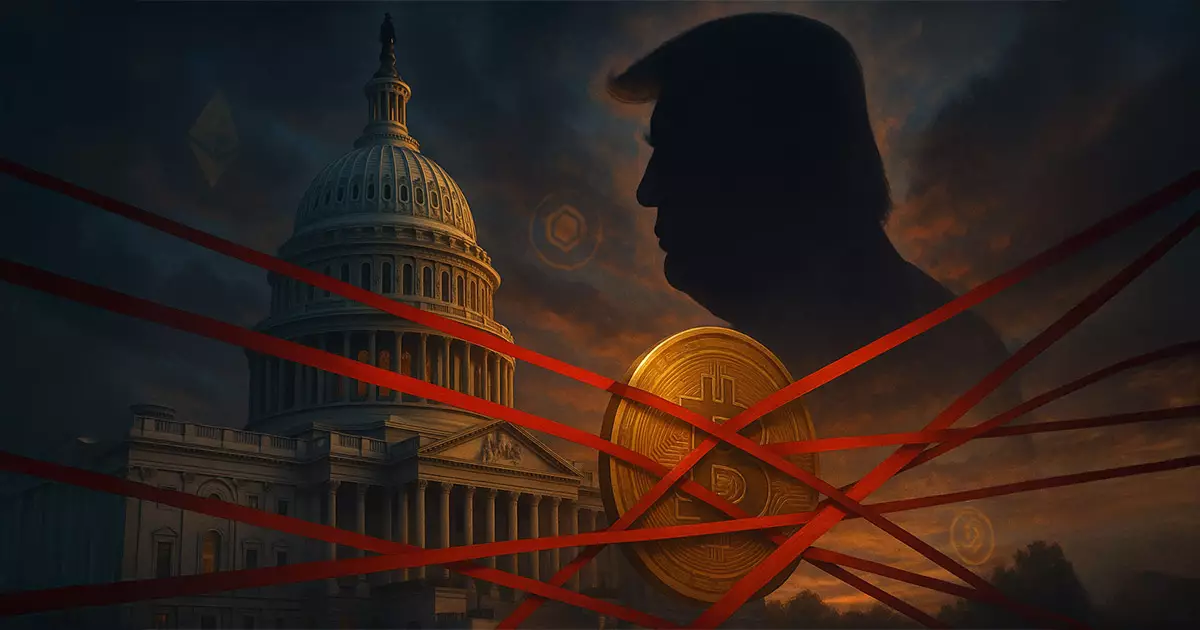As the political landscape continues to shift and evolve, the intertwining of cryptocurrency ventures and personal interests has created a contentious backdrop for U.S. policymaking. The ongoing scrutiny surrounding former President Donald Trump’s activities in the crypto space raises troubling questions about ethics, governance, and the impact on crucial legislation—a combination that paints a disturbing picture of influence and corruption.
Conflicted Interests: The Heart of the Matter
At the root of the problem lies an undeniable conflict of interest. As the leading architect of several high-profile crypto projects, Trump stands to gain financially from regulatory decisions that ought to be impartial and devoid of personal gain. Ryan Gilbert, a voice from the fintech community, encapsulates this sentiment by lamenting how Trump’s personal stakes hamper the legislative process. It’s a stark reminder that while lawmakers are tasked with safeguarding public interests, the personal ambitions of a polarizing figure like Trump can cloud their judgment. The failure to pass the GENIUS Act, aimed at establishing a cohesive framework for stablecoins, is a telling example of how one individual’s financial pursuits can obstruct broader economic policy.
The Unraveling of Legislative Progress
Once touted as a straightforward piece of legislation, the GENIUS Act has turned into a political football, reflecting the simmering tensions within both the Senate and the Democratic Party. Following a narrow defeat in the Senate, concerns about Trump’s financial undertakings chipped away at its bipartisan momentum. Even voices within the Democratic majority, who initially supported the bill, reversed their stance under the looming specter of ethics violations tied to Trump’s ventures. The broader implications are alarming: the stalling of critical legislation not only hampers the crypto industry’s growth but also delays essential protections against potential fraud and malfeasance, leaving ordinary Americans vulnerable.
Fallout for the Average Investor
The ramifications of Trump’s crypto endeavors go beyond political maneuvering; they cascade down to the everyday investor. The launch of the $TRUMP memecoin serves as a case study in the risks presented by crypto assets that lack transparency and ethical oversight. With a meteoric rise to prominence, the coin allowed Trump-linked firms to amass significant profits, while retail investors witnessed their investments plummet, leading to staggering losses. This asymmetric financial impact offers a reminder that while Trump may enrich himself, it often comes at the expense of the average American, who dreams of financial independence through emerging technologies.
Wealth and Influence: The New Power Structure
Capitalizing on the chaos of the crypto landscape, Trump has arguably constructed a new form of power—one that merges wealth with political influence. As seen in discussions about his ties to Binance and the meteoric rise of Trump-related crypto projects, there’s a potential for regulatory capture that harkens back to historical abuses of power. Multiple lawmakers have directly called out this behavior as tantamount to corruption, with Congressman Mark Kelly pushing for stricter laws to prevent similar conflicts of interest from tainting governance in the future. It raises an uncomfortable question: How many politicians place duty above personal profit?
The Dangerous Precedent of Endorsing Cryptocurrency
The recent push for the End Crypto Corruption Act, introduced by Senator Kelly, signals a growing recognition of the threats posed by politicians endorsing cryptocurrencies. If enacted, it aims to barr Congress members and their relatives from engaging in the crypto space, a move that reflects an urgent need to eliminate conflicts that undermine democratic transparency. Trump’s financial gains from his memecoins drive home the need for stringent regulations. Instead of enriching their coffers under the guise of innovation, lawmakers should focus on ensuring that regulatory frameworks prioritize public trust and consumer protection.
The Future of Crypto Legislation: A Complicated Road Ahead
Despite the hitches created by Trump’s personal equity in cryptocurrencies, there remains optimism within bipartisan circles regarding the eventual passage of the GENIUS Act. Legislators on both sides understand the pressing need for a stable regulatory framework to empower innovation while safeguarding the public. Yet this path forward is fraught with complexities, given that suspicion regarding conflicts of interest could revive havoc at any moment. The tone of future negotiations will need to reflect transparency, accountability, and a genuine commitment to public welfare, but achieving such decorum in a climate rife with interests is a monumental task.
What we observe today is a unique intersection of personal wealth, political intrigue, and the burgeoning field of cryptocurrency—a scenario that should send chills down the spines of anyone who values ethical governance in a democratic society. The specter of Trump’s financial entanglements highlights the urgent need to address corruption and ensure that policy decisions reflect the greater good, rather than the interests of an elite few.

